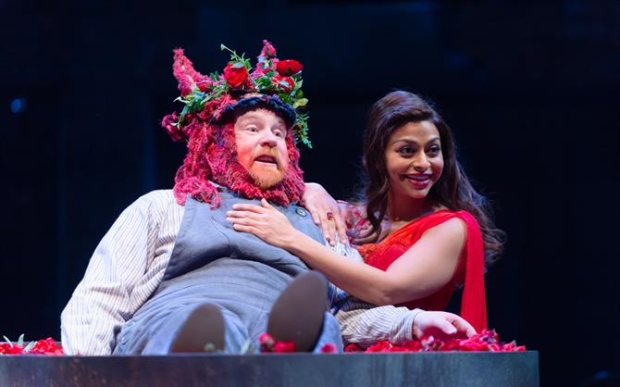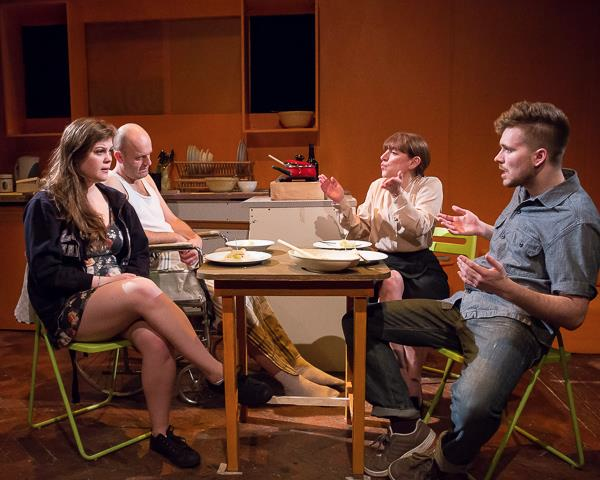Michael Coveney: RSC Dream and Lee Hall at the Tower are the tip of the am-dram iceberg
Are the demarcation lines between the amateur and professional theatres even more blurred than we imagine?

© Topher McGrillis
It is astonishing that, in the current RSC revival of A Midsummer Night’s Dream – billed as a play for the nation – in which local amateurs play the roles of Bottom and the mechanicals in each town the show visits on tour, you would be hard-pressed to distinguish the professionals from the amateurs.
This might say something about current standards at the RSC, but it certainly says a lot for the likes of the Nonentities of Kidderminster (who took part on the press night) where confidence, audibility, characterisation tactics and energy were palpable.
It also says a lot about the RSC’s Open Stages programme, launched in Michael Boyd‘s tenure as artistic director partly in response to the local amateurs’ traditional access to the Royal Shakespeare Theatre in Stratford-upon-Avon during the winter months being denied as a result of the closure for the re-build.
Boyd is on record as saying that the best King Lear he ever saw was an amateur production – he obviously missed Paul Scofield’s and Donald Wolfit’s – but the impulse was primarily social and political, banging the drums of inclusivity and access. The Dream – with its troupe of mechanicals "putting on a play" for the wedding party in King Theseus’s palace – is an obvious outcome of Boyd’s enthusiasm; the genius of Shakespeare was to write a character, Bottom, who lives another kind of erotic dream in the arms of Titania.
Last weekend I found myself in another version of am-dram land with the Tower Theatre’s revival of Lee (Billy Elliot) Hall’s Cooking with Elvis at the Theatro Technis in Camden Town. The Tower, which celebrates its 75th anniversary in 2017, currently performs in two well-known London fringe venues, the Technis and the Bridewell Institute just off Fleet Street.

© David Sprecher – Tower Theatre Co. 2016
And here’s the thing. I entered the slightly dilapidated premises as a stranger. Everyone in the foyer, and in the audience, knew each other. They were part of a club, a community of common purpose and dedication. They were releasing their inner thespians in a parallel universe of theatre. I overheard one punter telling another that he had been up until five o’clock that morning working on his design for the next production. The lady selling the tickets (£14 a throw, bit steep, I thought, but no ATG-style booking or restoration fee) collected the laminated passports to theatre-land from her front-of-house colleagues as she sat in the cavernous, oddly shaped interior. The audience numbered about eighty people.
And the performance was superb: better than good, less than tremendous, but still superb. And it’s still shocking, sexy stuff, even fifteen years after comedian Frank Skinner bared his buttocks as the witless cake-maker who provides vigorous rumpy-pumpy for both the sex-starved wife of a quadriplegic former Elvis impersonator – who leaps out of his wheelchair to perform several items from the King’s Las Vegas repertoire – and their borderline obese daughter.
There’s also a pet tortoise, which is baked in a pie and served up for Stu’s supper – a clear case of "Tortoise Andronicus" said Sheridan Morley first time round – and a series of physical encounters covering the waterfront: every possible genital engagement and a climactic deed of masturbation mercy.
Good Lord, I don’t think such a scenario was in the minds of the venerable founders of the am-dram movement between the wars. But the audience gave the impression they expected nothing less; they evinced a spirit of what the Yorkshire novelist Phyllis Bentley said of her membership of the Halifax Thespians in 1948: "a passport to a true comradeship in art."
And in the role of the obese daughter, Olivia Baker gave a performance so touching and true that you’d never stoop to describing her as an amateur; her programme credits list Ruth in Blithe Spirit and Catherine in A View from the Bridge, and she could have played either role, no problem, on the West End stage.
Are the demarcation lines between the amateur and professional theatres, as sussed by Boyd and now investigated by Erica Whyman in her RSC Dream, even more blurred than we imagine? Michael Gambon, after all, is the president of the Tower – whose actors plays the mechanicals when The Dream comes to the Barbican in May – and Ian McKellen patron of am-dram’s governing body, the Little Theatre Guild.












